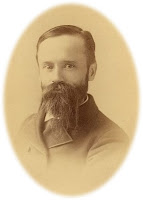Female! What female do you mean? Not a female donkey? Must not your reply be, 'I mean a female woman'? Then... why degrade the feminine sex to the level of animals... I write thus earnestly because I wish to have Vassar College take the lead in this great improvement in our language... I plead for the good of Vassar College, for the honor of womanhood and the glory of God.
The school had been in the works for four years by then, but Hale won out, and the school's name was changed to the simple title "Vassar College" in 1867. The term "Female" was scratched off the main building (pictured below). In their continued correspondence, Hale also objected to a school dress code and a proposed three-month academic break between December and April. One of the original "Seven Sisters," the school is now coeducational.
 Hale supported the education of women in her ongoing efforts to promote economic self-sufficiency for her sex. This was the case in her own life; after the death of her husband, she was left with several children, and turned to the publishing industry for money. In her decades at Godey's Lady's Book, the "editress" (as she called herself) helped magazine one of the highest-selling monthly of the century. The influence she exuded over Vassar is a good example of the reputation she built for herself. Her interest in reform stopped (somewhat controversially) before reaching the political realm, however: she believed women had no need to vote, so long as they had influence over their husbands.
Hale supported the education of women in her ongoing efforts to promote economic self-sufficiency for her sex. This was the case in her own life; after the death of her husband, she was left with several children, and turned to the publishing industry for money. In her decades at Godey's Lady's Book, the "editress" (as she called herself) helped magazine one of the highest-selling monthly of the century. The influence she exuded over Vassar is a good example of the reputation she built for herself. Her interest in reform stopped (somewhat controversially) before reaching the political realm, however: she believed women had no need to vote, so long as they had influence over their husbands. *More on the correspondence of Hale and Vassar is here.






















